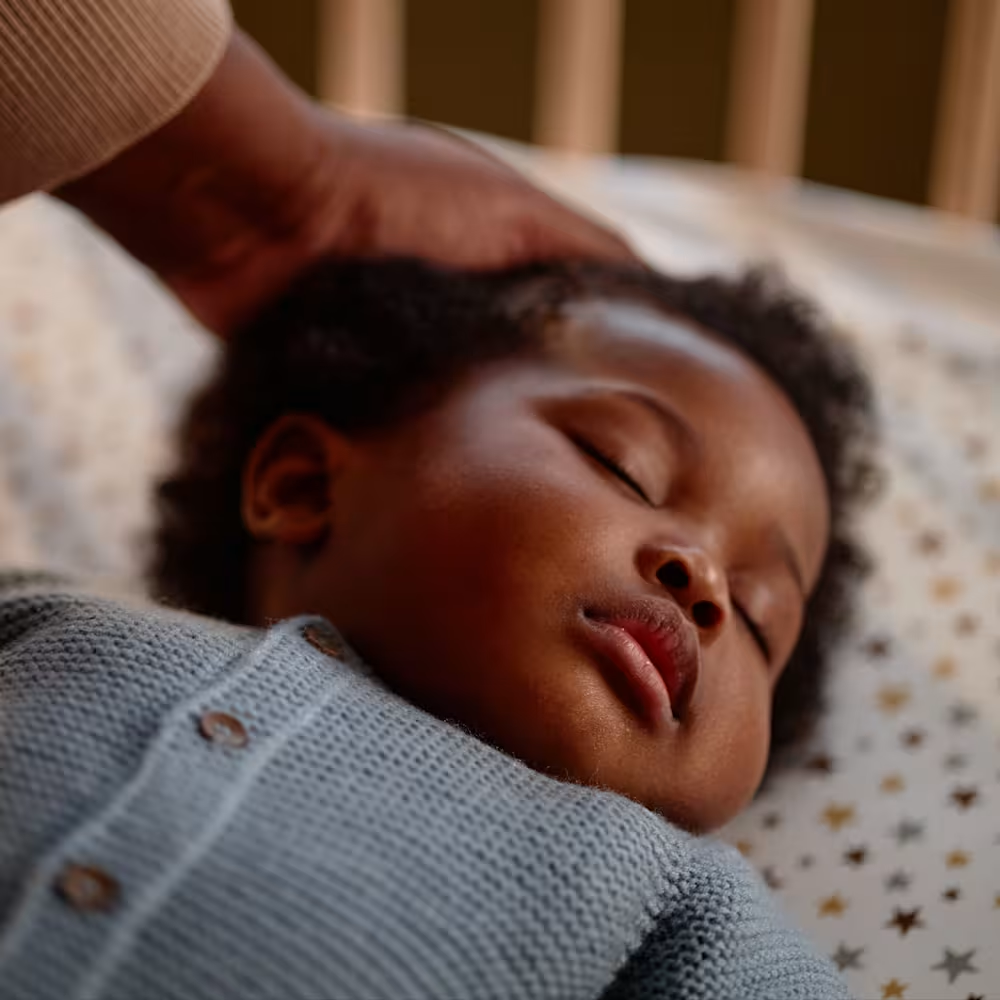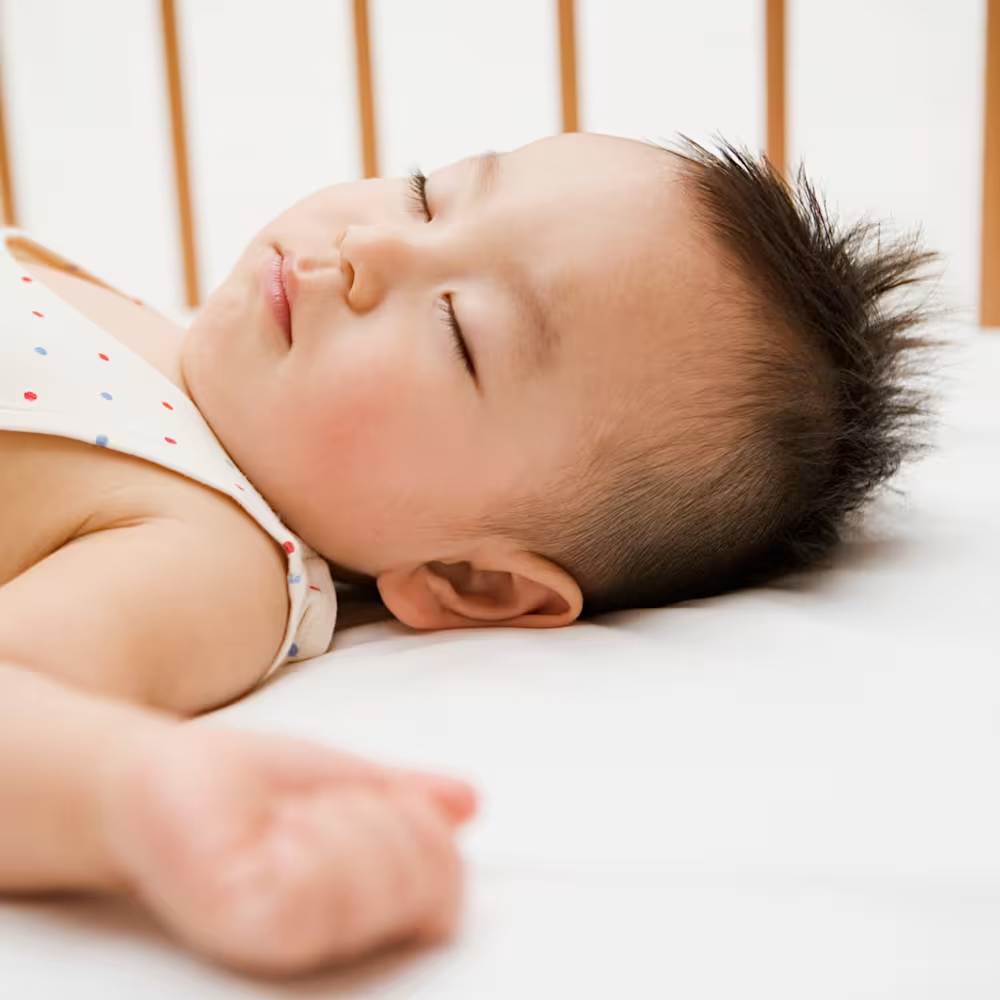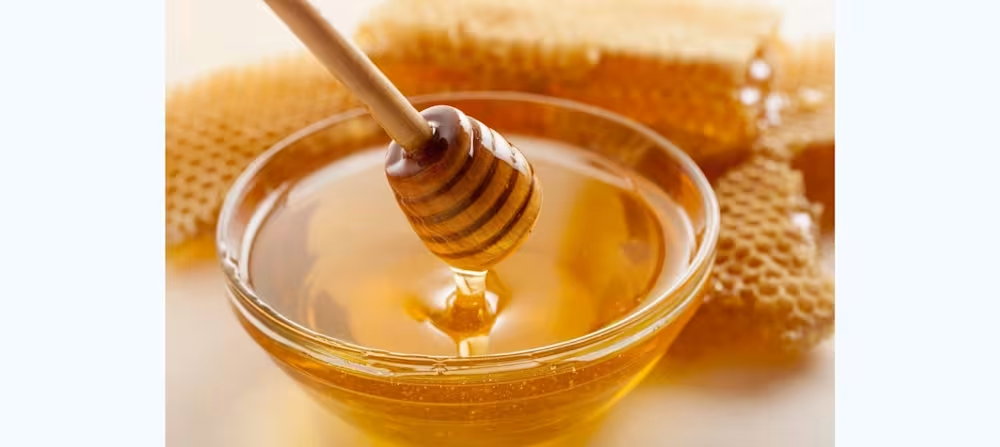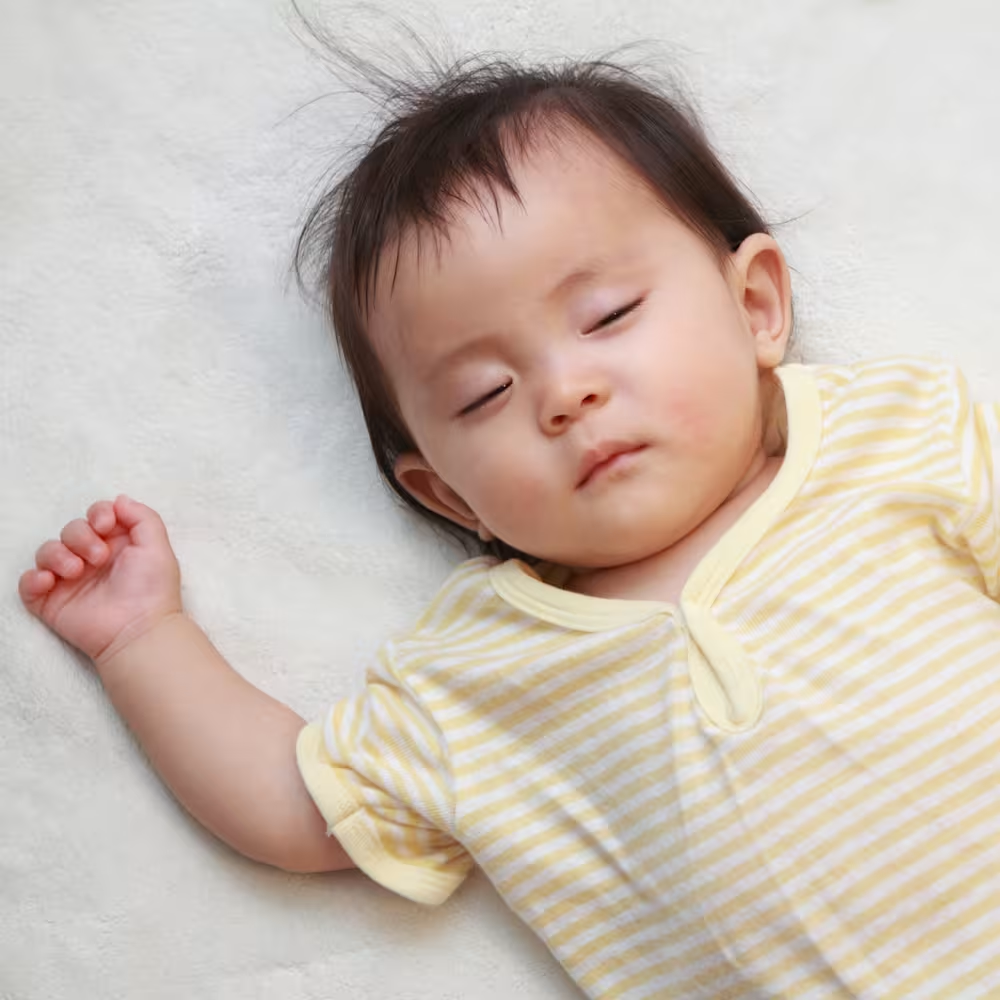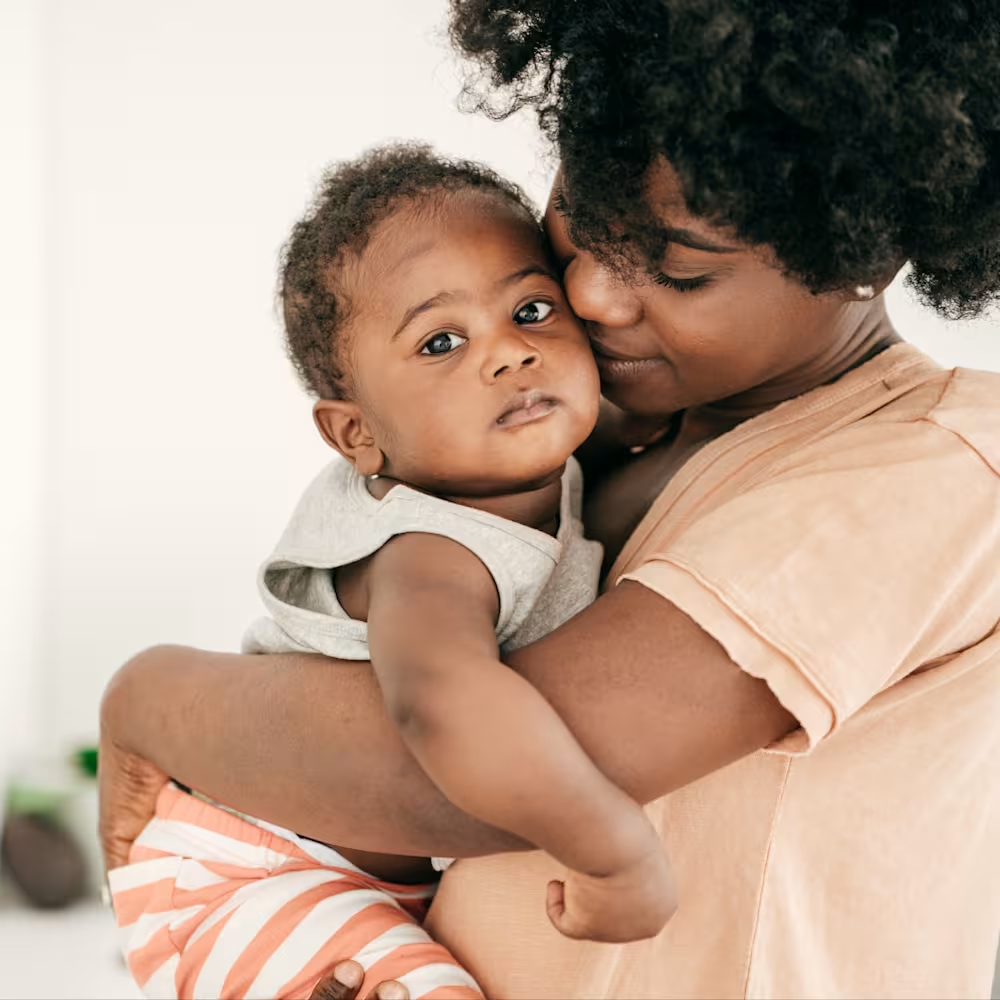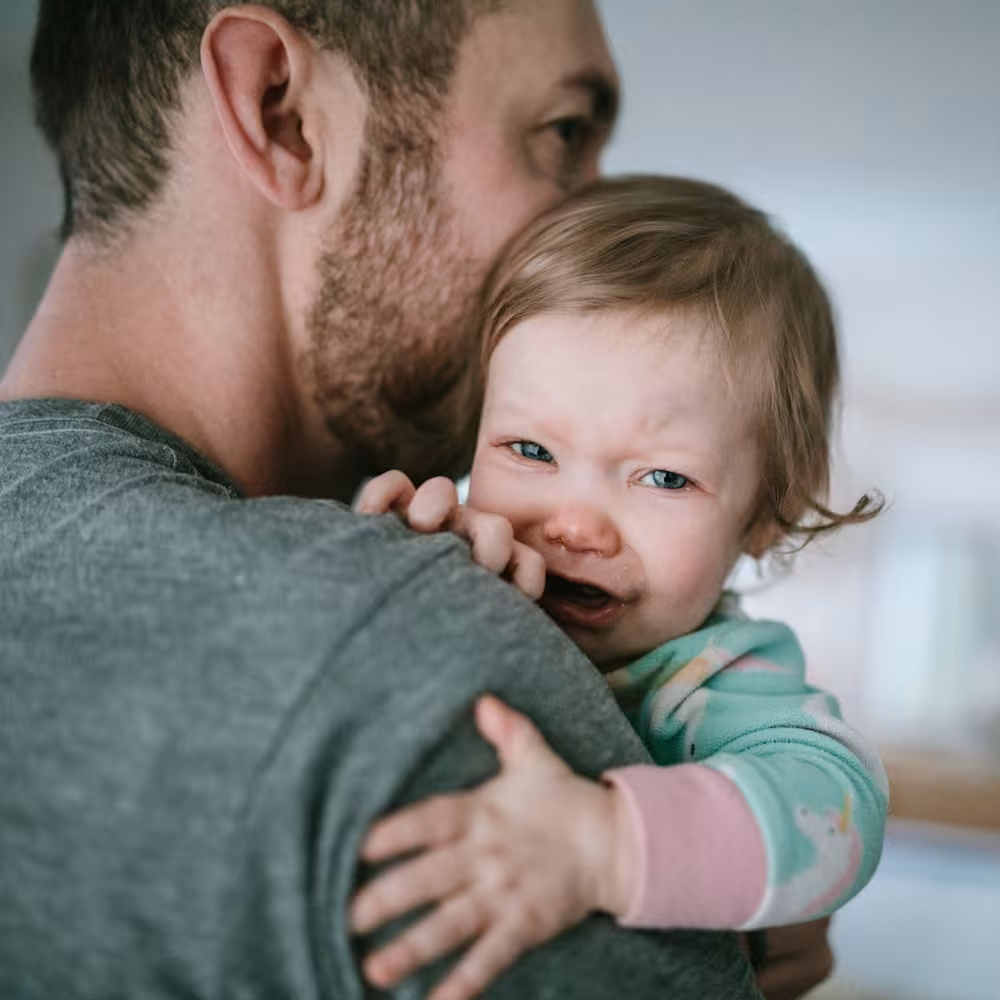Is your baby coughing in their sleep? What’s normal and what’s not
Updated Oct 16, 2025

Few things jolt you awake faster than the sound of your baby coughing at night, especially when they seemed fine during the day. However, coughing is common, even during sleep. It’s usually harmless, though there are times when your baby’s cough deserves a closer look. In this guide, we’ll cover common causes of your baby coughing in sleep, when to get it checked out, and what to do to help your little one rest more peacefully.
Why do babies cough in their sleep?
Coughing during sleep can sound alarming, but it’s often the result of something simple and manageable. In many cases, the cough gets worse at night because lying down allows mucus to pool in the throat, triggering the body to cough it out — a common effect of post-nasal drip []. Below are some of the most common reasons babies and younger toddlers cough at night, along with how to spot the signs and when to reach out to your pediatrician.
A cold or another viral infection
Even a mild cold can bring on a nighttime cough. In babies, a virus-related cough may be either wet or dry, and it often appears alongside congestion, a runny nose, crankiness, increased fussiness during feeding [], and . These coughs are often more noticeable at night, when mucus from post-nasal drip pools in the back of the throat and irritates the airway [].
GERD
Reflux (GER) is a common condition in babies under 12 months. It occurs when stomach contents flow back into the esophagus, which can irritate the throat. However, if your baby spits up frequently, seems uncomfortable, and coughing is noticed, these symptoms may be associated with a more chronic condition, gastroesophageal reflux disease (GERD) []. A pediatrician can help determine if a baby has GER, GERD, or another condition.
Dry or overly humid air
If your baby keeps coughing in their sleep but seems fine during the day, take a look at their room environment. Air that’s too dry or too humid can irritate sensitive airways, especially during winter or in tightly climate-controlled spaces. The ideal indoor humidity range is 35 - 50% []. Staying within this window may help reduce coughing.
Croup
A dry or hoarse cough in babies could be a sign of croup, a specific type of viral illness that causes swelling in the upper airway []. Croup coughs tend to sound “barky” or seal-like, and may come with noisy, raspy breathing or a hoarse voice. Although manageable, symptoms often worsen at night. Call your pediatrician if your baby has any trouble breathing or sounds especially hoarse.
Whooping cough
Whooping cough (or pertussis) can start out looking just like a cold with a runny nose and mild cough but often progresses into severe, rapid coughing fits followed by a sharp “whoop” sound when your baby inhales []. Some babies may not cough at all and instead experience breathing pauses (apnea), which can cause them to turn blue or struggle to breathe. If you notice these signs, or your baby seems very unwell during or after a coughing spell, seek medical care right away.
Asthma
Asthma is difficult to diagnose in babies, but it can sometimes appear as a persistent nighttime cough, wheezing, or fast, shallow breathing []. Other possible signs include flaring nostrils, chest retractions, trouble feeding, or fatigue during regular activity. If you notice any of these symptoms — especially if they keep coming back — talk to your pediatrician.
Bronchiolitis
Bronchiolitis is a common lower respiratory infection in babies, usually caused by a virus like RSV []. It leads to inflammation and mucus buildup in the small airways of the lungs, which can cause coughing, wheezing, and fast or shallow breathing, particularly during sleep. While most cases are mild and go away on their own, bronchiolitis can sometimes make it hard for babies to eat, sleep, or breathe comfortably, so it’s a good idea to check in with your pediatrician if you notice any of these symptoms.
When is it normal and when to worry?
Not every cough is cause for concern. Coughing during sleep here and there tends to show up for lots of babies, especially during cold season or when the air is dry. However, some coughs warrant a closer examination, especially when accompanied by additional symptoms. Here’s how to tell the difference between harmless and potentially concerning nighttime coughs:
Normal coughing in babies
Your baby has mild cold symptoms, such as a runny nose, sneezing, or slight congestion, but is otherwise eating, breathing, and sleeping reasonably well [].
Your baby only coughs occasionally, and the episodes are short-lived (for example, a brief cough here and there during the night, rather than ongoing or intense coughing fits).
The cough gets better with simple changes, like using a humidifier or adjusting your baby’s sleep position (if age-appropriate) [].
Your baby is under 12 months old and has occasional coughs but no other signs of illness or distress [].
Your baby has a mild, wet-sounding cough but seems comfortable, alert, and is feeding well. Still, it’s a good idea to check in with your pediatrician if it lasts more than a few days or worsens [].
When your baby’s cough deserves a closer look
The cough doesn’t improve or gets worse over 10 days []
Cough is paired with a fever []
Cough is accompanied by other symptoms, like poor feeding or unusual fatigue for their mood and activity levels []
The cough is dry, hoarse, or barky and comes with noisy breathing or a hoarse voice, which may indicate croup []
The cough sounds like a “whoop” or ends in gagging or vomiting (potential signs of pertussis, also known as whooping cough) []
You may notice signs that suggest asthma or bronchiolitis, such as frequent coughing, wheezing, trouble breathing during everyday activities, or a cough that worsens when exposed to pets, dust, or cold air []
If you’re ever unsure, trust your gut and call your pediatrician. You know your baby best, and it’s always OK to ask for a second opinion when something feels off.
What to do if your baby coughs at night
Middle-of-the-night baby coughs can be stressful, but there are a few things you can do to make your little one more comfortable. These tips won’t cure a cough overnight, but they can help ease symptoms, improve sleep, and support your baby’s recovery.
Tip #1: Use a humidifier or try a steam session
Dry air can exacerbate nighttime coughing. A cool-mist humidifier adds moisture back into the room and may help soothe irritated airways []. Make sure to place it close enough that the mist reaches your baby, but always out of their reach for safety. Be sure to clean it daily to prevent the buildup of mold or bacteria [].
No humidifier? You can create a steam room effect by running a hot shower and sitting with your baby in the steamy bathroom for 10 - 15 minutes before bed. It’s a simple way to loosen mucus and ease congestion. Just keep a close eye on your baby and leave if they seem overheated or uncomfortable.
Tip #2: Try saline drops and gentle suction
If your baby’s nose is stuffed up, clearing it out before sleep can help them breathe more easily — and hopefully cough less. A few drops of saline solution in each nostril can help loosen thick mucus []. Afterward, use a bulb syringe or nasal suction tool to remove the gunk gently.
You can repeat this before naps or feedings, but avoid overdoing it — too much suction can irritate the nasal lining. If your baby hates it (and many do!), try to keep it quick and soothing.
Tip #3: Keep them hydrated
Fluids help thin mucus, regulate body temperature, and support the immune system, which are all important when your baby has a cough [] For younger babies, breast milk or formula is all they need. For babies 6 months and older, small sips of water or clear, unsweetened fluids may also be helpful.
Offer frequent feeds, especially if your baby is fussy or eating less than usual. Also, be aware of signs of dehydration, such as consistently fewer wet diapers or a dry mouth.
Tip #4: For babies over 12 months, try a little honey
If your baby is at least 1 year old, a small spoonful of honey before naps or bedtime may help coat their throat and ease a dry or scratchy cough. According to a 2022 study, honey can be as effective in the first 3 days of onset as over-the-counter cough suppressants for kids) [].
Safety tip: Never give honey to a baby under 12 months. It can cause infant botulism, a rare but serious illness [].
Tip #5: Skip the cough medicine
We know it’s tempting, but over-the-counter cough medications aren’t safe for babies or toddlers under 4 years old []. Stick with supportive care and contact your pediatrician if the cough persists, worsens, or significantly interferes with your kiddo’s sleep.
Tip #6: Avoid propping babies under 12 months up with pillows
Elevating your baby’s head might seem like a good idea if they’re coughing more when lying flat, and for older toddlers, a pillow might help. But for babies under 12 months, the AAP does not recommend using pillows, wedges, or sleep positioners, as they can increase the risk of suffocation and SIDS [] . If your pediatrician recommends elevation for reflux or congestion, ask about safe crib adjustments.
Tip #7: Minimize irritants in their sleep space
Sometimes the problem isn’t just a cold, it’s what’s in the air. Smoke, dust, strong fragrances, and pet dander can all exacerbate coughing, especially if your child has asthma []
Try these strategies to keep your baby’s environment as clean and comfortable as possible:
Keep your baby away from smoking, both indoors and outdoors []
Regularly vacuum the room they sleep in and wash bedding frequently
Avoid scented candles, cleaning sprays, or perfumes near your child’s sleep space
Baby coughing in sleep by age
Coughing can mean different things depending on your baby’s age and stage of development. Here’s a breakdown to help you understand what’s typically harmless, what might need a closer look, and when to call the pediatrician.
Age range | Possible causes | What's usually normal | When to talk to a doctor |
0 - 3 months | Nasal congestion, reflux, immature airway | Occasional coughs after feeding or during sleep, especially if they clear on their own | Any recurring coughing, poor feeding, fever, or trouble breathing [] |
4 - 6 months | Viral colds, reflux, asthma and other causes of post-nasal drip | Occasional coughing after feeding or during sleep, especially if your baby is otherwise alert and feeding well during the day | Any recurring cough, signs of labored breathing, fever lasting more than 3 days, or signs of earache [] |
7 - 12 months | Post-nasal drip, mild infections, asthma, bronchiolitis, or reflux
| Coughing during sleep with other cold symptoms like a runny nose or mild fussiness | Cough lasting longer than 10 days without improvement, worsening at night, or paired with wheezing, fever, difficulty breathing [] or signs of an earache |
1 year and older | Colds, allergies, asthma, environmental irritants, reflux | Occasional nighttime coughs with mild symptoms, especially during cold season or after exposure to allergens | Cough lasting longer than 10 days without improvement, worsening at night, or paired with wheezing, fever that lasts more than 5 days, difficulty breathing [] or signs of an earache |
When to call a doctor
Coughing is common in babies, but sometimes it’s a sign that something more serious is going on. Here’s a breakdown of when to call your pediatrician — and when to seek emergency care right away [].
Call during office hours if:
Coughing leads to vomiting 3 or more times
The cough lasts more than 3 weeks
You have questions or concerns and want to check in with your care team
Call your doctor within 24 hours if:
Your baby is under 6 months old and has an ongoing cough
They have an earache or ear drainage
A fever lasts more than 3 days or returns after going away
You feel your baby should be seen, even if the issue doesn’t seem urgent
Call your doctor or seek care now if:
Your baby is having trouble breathing (fast, shallow, or noisy breathing)
Coughing fits are nonstop or severe
Wheezing (a high-pitched sound while exhaling) or stridor (a harsh sound when inhaling) is present
Your baby turns blue during a coughing spell
Breathing looks labored, with ribs pulling in or belly working extra hard
Milk intake is less than half the usual amount, or dehydration is suspected (fewer than 3 wet diapers in 24 hours, no tears when crying, very dry mouth)
Fever is higher than 104°F at any age (or any fever occurring in a baby under 12 weeks old)
Your baby looks or acts very sick or unusually lethargic
Call 911 or seek emergency care immediately if:
Your baby is struggling for each breath or can barely cry
Breathing stops or your baby briefly passes out
Their lips, face, or tongue turn blueish or gray when not coughing
You suspect a life-threatening emergency
Takeaway
Babies may cough in their sleep for a variety of reasons, including reflux, mild viral infections, or dry air — especially under 12 months old.
Call your pediatrician if your baby’s cough worsens, is accompanied by a fever, lasts more than 10 days, or interferes with sleep, feeding, or breathing [].
Supportive care like saline drops, suctioning, humidifiers, and plenty of fluids can help most babies feel better [].
Share article:
Note: The content on this site is for informational purposes only and should not replace medical advice from your doctor, pediatrician, or medical professional. If you have questions or concerns, you should contact a medical professional.
19 Sources
Share article:
